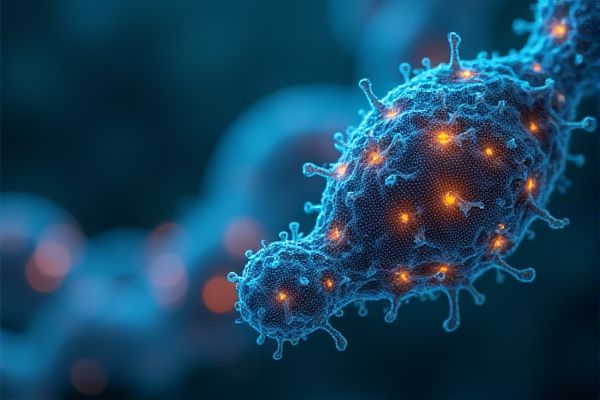
AI significantly enhances the field of biotechnology by streamlining research and development processes. Machine learning algorithms analyze vast biological data sets, identifying patterns that facilitate drug discovery and genetic research. Predictive modeling aids in understanding biological processes, leading to innovative solutions in areas such as personalized medicine and agriculture. By optimizing experimental designs and automating routine tasks, AI accelerates the pace of biotechnological advancements, benefiting healthcare and environmental sustainability.
AI usage in biotechnology advancements
Genomic Data Analysis
AI can enhance genomic data analysis by efficiently processing large datasets to uncover genetic variations. Companies like 23andMe utilize AI to improve their insights into ancestry and health traits. This technology allows researchers to identify potential biomarkers for diseases, increasing the chance of developing targeted therapies. Improved accuracy in genomic studies might ultimately lead to personalized medicine, benefiting patient outcomes significantly.
Drug Discovery and Development
AI applications in biotechnology have the potential to streamline drug discovery and development processes. Machine learning algorithms can analyze vast datasets to identify promising drug candidates more efficiently than traditional methods. Institutions like Drug Discovery Innovation Hub are leveraging AI to enhance predictive modeling and reduce timeframes for clinical trials. The integration of AI could lead to significant cost savings and the development of targeted therapies for various diseases.
Precision Medicine
AI can enhance precision medicine by analyzing genetic data to identify tailored treatment options for patients. By leveraging large datasets, algorithms can predict disease progression and treatment outcomes more accurately. This capability may lead to more efficient drug development processes, as seen with companies like Novartis exploring AI-driven research. Overall, the integration of AI in biotechnology presents a promising avenue for improving patient care and treatment efficacy.
Protein Structure Prediction
AI applications in biotechnology can significantly enhance protein structure prediction, offering the potential for breakthrough discoveries. For instance, tools developed by institutions like DeepMind, such as AlphaFold, have shown remarkable accuracy in predicting protein configurations. This can lead to more efficient drug discovery processes and improved understanding of biological functions. The ability to forecast protein structures may also optimize research in areas like genetic engineering and synthetic biology.
Agricultural Biotechnology
AI can enhance agricultural biotechnology by optimizing crop yields and developing pest-resistant varieties. Companies like Bayer are leveraging machine learning algorithms to analyze genetic data, which increases the possibility of creating more resilient plants. Predictive analytics can also help farmers manage resources efficiently, reducing costs and environmental impact. As AI continues to evolve, its integration into biotechnology could significantly improve food security and sustainability.
CRISPR Gene Editing
AI has the potential to significantly enhance biotechnology advancements, particularly in areas like CRISPR gene editing. By analyzing large datasets, AI can help identify target genes more efficiently, improving the precision of gene modifications. Institutions such as the Broad Institute are exploring AI-driven approaches to accelerate research outcomes. This synergy could lead to more effective treatments for genetic disorders, showcasing the advantages of integrating AI in biotechnology.
Bioinformatics Tools
AI application in biotechnology can enhance drug discovery processes by analyzing large datasets to identify potential therapeutic targets. Bioinformatics tools, such as BLAST and ClustalW, facilitate the analysis of genetic sequences, enabling researchers to predict protein functions more accurately. The integration of AI with these tools may increase the efficiency of genomic analyses, offering greater insights into complex biological systems. This synergy could lead to significant advancements in personalized medicine, where treatments are tailored to individual genetic profiles.
Synthetic Biology
AI has the potential to significantly enhance advancements in biotechnology, particularly within the field of synthetic biology. By analyzing vast datasets, AI algorithms can identify patterns that inform the design of new biological systems, such as engineered microorganisms for drug production. Companies like Ginkgo Bioworks leverage AI to optimize the design and testing of synthetic organisms, increasing efficiency and success rates. The integration of AI may lead to faster innovations, providing a competitive edge in developing solutions for healthcare and environmental challenges.
Disease Diagnostics
AI has the potential to enhance biotechnology advancements, particularly in disease diagnostics. Machine learning algorithms can analyze large datasets from genomic studies, leading to quicker and more accurate identification of diseases. For instance, institutions like Johns Hopkins University are leveraging AI to improve their diagnostic capabilities. The integration of AI can streamline workflows, allowing for earlier interventions and better patient outcomes.
Bioproduction Efficiency
AI can enhance bioproduction efficiency by optimizing processes in areas such as fermentation and cell culture. For instance, institutions like MIT are leveraging machine learning algorithms to predict optimal growth conditions for microorganisms. This can lead to reduced costs and time in producing biofuels or pharmaceuticals. The potential for increased yield and faster development timelines presents a significant advantage in the competitive biotechnology field.
 techknowy.com
techknowy.com